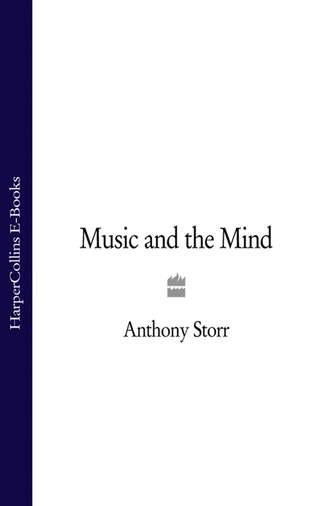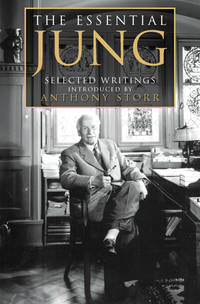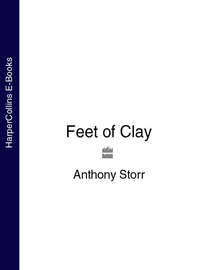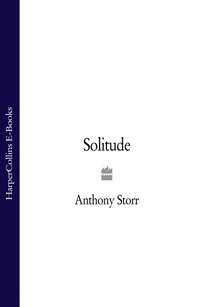
Полная версия
Music and the Mind
No matter how important lexico-grammatical meaning eventually becomes, the human brain is first organized or programmed to respond to emotional/intonational aspects of the human voice.15
Since infants in the womb react both to unstructured noise and to music with movements which their mothers can feel, it seems likely that auditory perception prompts the baby’s first realization that there is something beyond itself to which it is nevertheless related. After birth, vocal interchange between mother and infant continues to reinforce mutual attachment, although vision soon becomes equally important. The crooning, cooing tones and rhythms which most mothers use when addressing babies are initially more significant in cementing the relationship between them than the words which accompany these vocalizations. This type of communication continues throughout childhood. If, for example, I play with a child of eighteen months who can only utter a few words, we can communicate in all kinds of ways which require no words at all. It is probable that both of us will make noises: we will chuckle, grunt, and make the kinds of sounds which accompany chasing and hiding games. We may establish, at least for the time being, a relationship which is quite intimate, but nothing which passes between us needs to be expressed in words. Moreover, although relationships between adults usually involve verbal interchange, they do not always do so. We can establish relationships with people who do not speak the same language, and our closest physical relationships need not make use of words, although they usually do so. Many people regard physical intimacy with another person as impossible to verbalize, as deeper than anything which words can convey.
Linguistic analysts distinguish prosodic features of speech from syntactic: stress, pitch, volume, emphasis, and any other features conveying emotional significance, as opposed to grammatical structure or literal meaning. There are many similarities between prosodic communication and music. Infants respond to the rhythm, pitch, intensity, and timbre of the mother’s voice; all of which are part of music.
Such elements are manifestly important in poetry, but they can also be in prose. As a modern example, we can consider James Joyce’s experiments with the sound of words which are particularly evident in his later works.
But even in his earliest stories the meaning of a word did not necessarily depend on the object it denoted but on the sonority and intonation of the speaker’s voice; for even then Joyce addressed the listener rather than the reader.16
It will be recalled that Joyce had an excellent voice and considered becoming a professional singer. He described using the technical resources of music in writing the Sirens chapter of Ulysses. Joyce portrays Molly Bloom as comprehending the hurdy-gurdy boy without understanding a word of his language.
One popular Victorian notion was that music gradually developed from adult speech through a separation of the prosodic elements from the syntactic. William Pole wrote in The Philosophy of Music:
The earliest forms of music probably arose out of the natural inflections of the voice in speaking. It would be very easy to sustain the sound of the voice on one particular note, and to follow this by another sustained note at a higher or lower pitch. This, however rude, would constitute music.
We may further easily conceive that several persons might be led to join in a rude chant of this kind. If one acted as leader, others, guided by the natural instinct of their ears, would imitate him, and thus we might get a combined unison song.17
Dr Pole’s original lectures, on which his book is based, were given in 1877, and bear the impress of their time, with frequent references to savages, barbarians, and the like. Although The Philosophy of Music is still useful, Pole shows little appreciation of the fact that music amongst pre-literate peoples might be as complex as our own. Twenty years earlier, in 1857, Herbert Spencer had advanced a similar theory of the origins of music, which was published in Fraser’s Magazine.*† Spencer noted that when speech became emotional the sounds produced spanned a greater tonal range and thus came closer to music. He therefore proposed that the sounds of excited speech became gradually uncoupled from the words which accompanied them, and so came to exist as separate sound entities, forming a ‘language’ of their own.
Darwin came to an opposite conclusion. He supposed that music preceded speech and arose as an elaboration of mating calls. He observed that male animals which possess a vocal apparatus generally use their voices most when under the influence of sexual feelings. A sound which was originally used to attract the attention of a potential mate might gradually be modified, elaborated, and intensified.
The suspicion does not appear improbable that the progenitors of man, either the males or the females, or both sexes, before they had acquired the power of expressing their mutual love in articulate language, endeavoured to charm each other with musical notes and rhythm. The impassioned orator, bard, or musician, when with his various tones and cadences he excites the strongest emotions in his hearers, little suspects that he uses the same means by which, at an extremely remote period, his half-human ancestors aroused each other’s ardent passions during their mutual courtship and rivalry.18
Géza Révész reproduced another theory of the origin of music, which was first advanced by Carl Stumpf, although Révész makes no direct acknowledgement to this earlier author. It is based on the perception that the singing voice has greater carrying power than the speaking voice. Early man, Révész supposes, when wishing to communicate with his fellows at a distance, discovered that he could do so more effectively by using a singing voice rather than a speaking voice. Révész affirms that giving vent to loud, resounding signals produces pleasure, and remembers his own delight in making his voice ring out into wide open spaces. He assumes that such calls can pass over into song quite easily. In other words, he tries to derive all music from the yodel.
It is true that musical sounds are used by pre-literate people for communication at a distance, and that wind instruments of considerable carrying power have been invented for this purpose. Allegedly, the Mura Indians of the Amazon communicate with each other across the great rivers in a special musical language which they play on a three-holed flageolet.19 Signalling by means of drums and horns is a widespread practice in Africa and elsewhere. Even so, communication using musical sounds is not itself music, and there is no direct evidence that such signals became transmuted into music.
Révész’s theory also fails to account for the rhythmic element in music, which ethnomusicologists find to be fundamentally important. Neither Révész nor Darwin nor Spencer are able to tell us why music became attractive to early men or their descendants.20
Jean-Jacques Rousseau, who was not only a revolutionary social theorist but also an accomplished composer, argued that musical sounds accompanied or preceded speech as we know it. In his biography of Rousseau, Maurice Cranston recounts from the Essai sur l’origine des langues Rousseau’s theory that
men first spoke to each other in order to express their passions, and that at the early stages of human society there was no distinct speech apart from song. Earliest languages, he suggests, were chanted; they were melodic and poetic rather than prosaic and practical. He also claims that it was men’s passions rather than their needs which prompted their first utterances, for passions would drive men towards others, whereas the necessities of life would impel each to seek his satisfaction alone. ‘It is not hunger or thirst, but love, hatred, pity and anger which drew from men their first vocal utterances.’ Primitive men sing to one another in order to express their feelings before they come to speak to one another in order to express their thoughts.21
John Blacking claims that singing and dancing preceded the development of verbal interchange.
There is evidence that early human species were able to dance and sing several hundred thousand years before homo sapiens sapiens emerged with the capacity for speech as we now know it.22
It may even have been the case, as the eighteenth-century Italian philosopher Giambattista Vico suggested, that human beings danced before they walked. He also thought that poetry came before prose, and that men naturally embodied their feelings. attitudes, and thoughts in symbols. The metaphorical use of language, according to Vico, preceded the literal or scientific; and he is not the only philosopher to think this. Heidegger wrote:
Poetry proper is never merely a higher mode (melos) of everyday language. It is rather the reverse: everyday language is a forgotten and therefore used-up poem, from which there hardly resounds a call any longer.23
The objective language generally used by scientists and philosophers, which is concerned with conceptual thought and with demonstration and proof rather than with evocation, and which usually avoids metaphor as far as possible, is quite different from the ‘musical’ language used by poets, by the pre-literate, or even by those who are not highly educated in the Western tradition. ‘The magnet loves iron’ is not a scientific explanation of magnetism, but is a naturally anthropomorphic way of speaking found the world over.
A world in which men naturally talk of the lips of a vase, the teeth of a plough, the mouth of a river, a neck of land, handfuls of one thing, the heart of another, veins of minerals, bowels of the earth, murmuring waves, whistling winds and smiling skies, groaning tables and weeping willows* – such a world must be deeply and systematically different from any in which such phrases are felt, even remotely, to be metaphorical, as contrasted with so-called literal speech. This is one of Vico’s most revolutionary discoveries.24
As Isaiah Berlin points out, all the metaphors listed above are taken from the human body. When human beings looked upon the external world and tried to describe it, it was natural that they did so in terms of their own subjective, physical experience. The language of science had not yet become dissociated from the language of poetry and music, and the notion that the phenomena of the external world could only be understood if anthropomorphism was excluded had not yet developed. The behaviourist idea that human beings can only properly be comprehended when their actions are observed with scientific objectivity rather than assessed by means of empathic understanding was far in the future. Vico would have agreed with John Blacking in supposing that a people’s music is one important key to understanding their culture and their relationships.
In ancient Greece, which is usually considered to be the birthplace of Western civilization, music was both ubiquitous and supremely important. Although we know little about how Greek music actually sounded, classical scholars refer to it as ‘an art which was woven into the very texture of their lives’.25
As in our culture, elaborate instrumental skills were the preserve of professional musicians; but the Greeks considered that instruction in singing and in playing the lyre should be a regular part of education for every freeborn citizen. Music was an important feature of domestic celebrations, feasts, and religious rituals, and musical competitions were held alongside athletic contests. Poetry and music went hand in hand: the poetry of Homer, for example, was originally recited to the accompaniment of the lyre.
For the Greeks, music and poetry were inseparable. The poet and the composer were frequently the same person, so that often words and music were created together. The Greek word melos indicated both lyric poetry and the music to which a poem is set: it is the origin of our word ‘melody’. It is worth noting that, in spite of its mathematical connections, music accompanied the subjective language of poetry rather than the objective language of intellectual argument. We can imagine The Odyssey being chanted to musical accompaniment; we cannot imagine The Republic being similarly treated.
First of all, early poetry was song. The difference between song and speech is a matter of discontinuities of pitch. In ordinary speech, we are constantly changing pitch, even in the pronunciation of a single syllable. But in song, the change of pitch is discrete and discontinuous. Speech reels around all over a certain portion of an octave (in relaxed speech about a fifth). Song steps from note to note on strict and delimited feet over a more extended range.
Modern poetry is a hybrid. It has the metrical feet of song with the pitch glissandos of speech. But ancient poetry is much closer to song. Accents were not by intensity stressed as in our ordinary speech, but by pitch. In ancient Greece, this pitch is thought to have been precisely the interval of a fifth above the ground note of the poem, so that on the notes of our scale, dactyls would go GCC, GCC, with no extra emphasis on the G. Moreover, the three extra accents, acute, circumflex, and grave, were, as their notations , , , imply, a rising pitch within the syllable, a rising and falling on the same syllable, and a falling pitch respectively. The result was a poetry sung like plainsong with various auditory ornamentation that gave it beautiful variety.26
The Greek word for this is . It cannot easily be translated; for it signifies musically determined verse, or music and poetry in one. Whereas modern Western verse is primarily linguistic, words which may or may not be set to music,
The ancient Greek verse line behaved differently. Here the musical rhythm was contained within the language itself. The musical-rhythmic structure was completely determined by the language. There was no room for an independent musical-rhythmic setting; nothing could be added or changed.27
Gradually, the musical component shrank, to be replaced by a system of accents; that is, by dynamic stresses which bore little relation to the original rhythm and which were not intoned at different pitches. Thrasybulos Georgiades, from whose book Music and Language I have just quoted, thinks that the original was replaced by prose and music as separate forms. Linguistically determined poetry followed, with verse rhythms governed by stress rather than pitch. It then became possible to set both prose and poetry to music in the ways familiar to us. So language and music could be recombined where this was thought appropriate, as, for example, in the Christian liturgy; but only after their initial unity had been disrupted and their independence from each other had been established.
Rousseau may well have been right in thinking that there was no distinct speech apart from song at the beginning of history. The psychoanalyst Anton Ehrenzweig, himself an accomplished musician, wrote:
It is not unreasonable to speculate that speech and music have descended from a common origin in a primitive language which was neither speaking nor singing, but something of both. Later this primeval language would have split into different branches; music would have retained the articulation mainly by pitch (scale) and duration (rhythm), while language chose the articulation mainly by tone colour (vowels and consonants). Language moreover happened to become the vehicle of rational thought and so underwent further influences. Music has become a symbolic language of the unconscious mind whose symbolism we shall never be able to fathom.28
If song and speech were initially more closely linked, and then became separated, it is understandable that the differences in their functions became accentuated. One can imagine that, as prose became less metaphorical, less anthropomorphic, more objective, and more precise, people would use this kind of speech for conveying information and expounding ideas, whilst reserving poetic and musical communication for religious and other rituals. However, even the speech used by scientists and mathematicians to explain and convey their ideas is never entirely devoid of varieties of tone, emphasis, and pitch. If this were the case it would be so monotonous that no one would listen to it.
Today, we are accustomed to listening to instrumental music which has no necessary connection with the human voice or with public ceremonies. We have also developed language to the point at which it can be used for scientific description or for conceptual thought without prosody, metaphor, or the expression of subjective feeling. Seen from the perspective of history, these changes are recent. I think that they are also connected. If we consider together the ideas of Vico, Rousseau, and Blacking, we can perceive that language and music were originally more closely joined, and that it makes sense to think of music as deriving from a subjective, emotional need for communication with other human beings which is prior to the need for conveying objective information or exchanging ideas.
Ethnomusicologists generally emphasize the collective importance of music in the cultures they study. There are a number of cultures which, like that of ancient Greece, do not distinguish music as a separate activity from those which it invariably accompanies. Singing, dancing, the recitation of poetry, and religious chant are so inseparably linked with music that there is no word for music as such. Indeed, it may be difficult for the observer to determine whether a particular activity includes music or does not. Ceremonial speech may, as in the case of Greek poetry, include rhythmic and melodic patterns which are so much part of it that words and music cannot really be differentiated.
The origins of music may be lost in obscurity but, from its earliest beginnings, it seems to have played an essential part in social interaction. Music habitually accompanies religious and other ceremonies. Some anthropologists have speculated that vocal music may have begun as a special way of communicating with the supernatural; a way which shared many of the features of ordinary speech, but which was also distinctive.29
Stravinsky would have agreed with this suggestion. In his Charles Eliot Norton lectures delivered at Harvard in 1939–40 he unequivocally affirms that ‘the profound meaning of music and its essential aim … is to promote a communion, a union of man with his fellow man and with the Supreme Being.’30
In pre-literate societies the arts are usually intimately connected with rituals and ceremonies which are dissociated from the routines of ordinary day-to-day living. As Ellen Dissanayake has cogently observed, the arts are concerned with ‘making special’; that is, with underlining and rendering ritualized forms of behaviour.31 In ritual, words are used metaphorically and symbolically and often reunited with music, which still further charges them with meaning. Raymond Firth, the anthropologist who wrote with such insight about Tikopia and other Pacific communities, states
Even songs, as a rule, are not composed simply to be listened to for pleasure. They have work to do, to serve as funeral dirges, as accompaniments to dancing, or to serenade a lover.32
Pre-literate societies have very little idea of the individual as a separate entity. They regard the individual as indissolubly part of the family, and the family as part of the larger society. Ritual and aesthetic activities are integral parts of social existence, not superstructures or luxuries which only the rich can afford. Amongst the Venda of the Northern Transvaal, music plays an important part in initiation ceremonies, work, dancing, religious worship, political protest – in fact in every collective activity. Especially important is tshikona, the national dance. This music can only be produced when
twenty or more men blow differently tuned pipes with a precision that depends on holding one’s own part as well as blending with others, and at least four women play different drums in polyrhythmic harmony.33
This description disposes of the notion that the music of rural African societies is less developed or less complex than our own: it is simply different. Tshikona is highly valued. It raises the spirits of everyone who participates. Blacking thinks this is because its performance generates the highest degree of individuality in the largest possible community; a combination of opposites rarely achieved. Playing in a modern Western orchestra or singing in a large choir may be enjoyable and uplifting, but neither activity provides much scope for individuality.
Music contributes both to the continuity and the stability of a culture whether pre-literate or not. That ardent collector of folksongs, Béla Bartók, deploring the changes brought about by the First World War and realizing that the type of music produced by a particular culture is inseparable from the nature of that culture, wrote:
I had the great privilege to be a close observer of an as yet homogeneous, but unfortunately rapidly disappearing social structure, expressing itself in music.34
The triumph of the West and the case of modern communication have caused the disappearance of different musics, as they have also diminished the number of spoken languages.
John A. Sloboda, a psychologist at the University of Keele, argues that pre-literate cultures may have even more need of music than our own.
Society requires organization for its survival. In our own society we have many complex artefacts which help us to externalize and objectify the organizations we need and value. Primitive cultures have few artefacts, and the organization of the society must be expressed to a greater extent through transient actions and the way people interact with each other. Music, perhaps, provides a unique mnemonic framework within which humans can express, by the temporal organization of sound and gesture, the structure of their knowledge and of social relations. Songs and rhythmically organized poems and sayings form the major repository of knowledge in non-literate cultures. This seems to be because such organized sequences are much easier to remember than the type of prose which literate societies use in books.35
Johann Gottfried Herder, supposedly the father of European nationalism, had made a similar observation in the eighteenth century.
All unpolished peoples sing and act; they sing about what they do and thus sing histories. Their songs are the archives of their people, the treasury of their science and religion.36
The music of the Australian aboriginals remained free from outside influences, and unknown to the West, until the arrival of the British two centuries ago.
Since all their knowledge, beliefs, and customs, upon whose strict preservation through exact ritual observance the constant renewal of nature (and hence their own survival) was held to depend, were enshrined in and transmitted by their sacred song-cycles, it is reasonable to think that theirs is the oldest extant, still practised music in the world. Since they had no form of writing or notation, oral tradition was the only means of retaining and inculcating their lore, and music therefore provided the essential mnemonic medium. As such it was invested with the utmost power, secrecy, and value.37
Bruce Chatwin, in his fascinating book The Songlines, demonstrates how songs served to divide up the land, and constituted title-deeds to territory. Each totemic ancestor was believed to have sung as he walked and to have defined the features of the landscape in so doing. Song was the means by which the different aspects of the world were brought into consciousness, and therefore remembered. As Chatwin observed, aboriginals used songs in the same way as birds to affirm territorial boundaries. Each individual inherited some verses of the Ancestor’s song, which also determined the limits of a particular area. The contour of the melody of the song described the contour of the land with which it was associated. As Chatwin’s informant told him: ‘Music is a memory bank for finding one’s way about the world.’38





